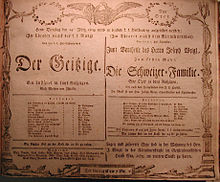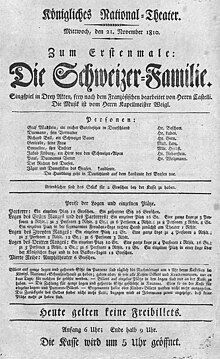The Swiss family
Die Schweizer Familie (also Schweizerfamilie or Schweitzerfamilie ) is a Singspiel with spoken dialogue by Joseph Weigl (music) and Ignaz Franz Castelli (libretto) that premiered on March 14, 1809 in Vienna's Kärntnertortheater .
Emergence
After the successful premiere of his Singspiel Das Waisenhaus , Weigl began setting Castelli's translation and arrangement of a vaudeville (song play) called Pauvre Jacques (Paris 1807) by Sewrin and Alissan de Chazet (pseudonyms for Charles-Augustin de Basson-Pierre and René André Polydore Chazet).
content
Wallstein, a wealthy German count, had a mountain accident while staying in the Swiss Alps. By chance he was rescued by the Swiss farmer Richard Boll, whom he would like to thank to offer a carefree life in Germany. He therefore had his Swiss homeland reproduced on his German estate and brought the farmer and his family to his home. However, Emmeline, the farmer's daughter, is driven insane with heartache because her lover Jacob Friborg has stayed in her homeland in Switzerland. But the count, who suspects her secret heartfelt connection to the shepherd, has him ordered from Switzerland on his estate. After a few entertaining scenes of confusion, the two lovers finally find each other.
The content of the opera, in which the romantic transfiguration of the Swiss landscape is an essential aspect, contributed significantly to a lasting enthusiasm for Switzerland in Europe.
Impact history
The work was premiered on March 14, 1809 in Vienna's Kärntnertortheater with Anna Milder as Emmeline, Johann Michael Vogl as Jacob Friborg and Carl Weinmüller as Richard Boll. It was one of the most frequently performed German operas in Europe in the first half of the 19th century and, alongside Peter von Winter's Interrupted Sacrifice Festival (1796), can be considered the most popular German folk opera between the Magic Flute (1791) and the Freischütz (1821).
Leading writers (such as Ludwig Börne ) and composers of the time admired the work, which was probably one of the first operas that Franz Schubert heard in the theater and also with new actresses by Emmeline (1822 for example Wilhelmine Schröder-Devrient and 1826 Nanette Schechner ) time and again visited. The final scene acquired special musical historical significance with the cow's song sounding backstage , a trio of clarinet (instead of shawm, shepherd's flute or alphorn), soprano and tenor without orchestral accompaniment. This passage in Weigl's score directly or indirectly influenced numerous well-known works of musical romanticism, such as the monodrama Gli amori di Teolinda by Giacomo Meyerbeer (1816), the singing scene The Shepherd on the Rock (D 965, October / November 1828), the penultimate composition of Schubert's written for Anna Milder, Le mal du pays in the Années de pèlerinage ( Première année, Suisse , No. 8) by Franz Liszt or even the shepherd scenes in Richard Wagner's Tannhauser , Tristan and the attempts to play the horn Siegfried . Wagner, who was particularly enthusiastic about Schröder-Devrient's portrayal of Emmeline, commented on her performance as follows: “How great was my emotion and my true astonishment when I was to get to know the incomprehensible woman in her truly adorable size that evening. The fact that something like the depiction of this Swiss girl cannot be recognized and handed down as a monument to all times, I must now recognize as one of the most sublime sacrificial conditions under which wonderful dramatic art only reveals itself, which is why this, as soon as such phenomena appear proclaim, cannot be held high and sacred enough. ”During his engagement as Kapellmeister in Riga in 1837 Wagner composed a prayer for the local actor of Richard Boll as an interlude aria .
The Swiss family disappeared from the stage at the beginning of the 20th century . In 2004 the Singspiel was performed again by the producer Sören Mund in the Schönbrunner Schlosstheater in Vienna, then in the Theater an der Sihl in Zurich and in the Berliner Schauspielhaus (Konzerthaus) on Gendarmenmarkt under the musical direction of Uri Rom, as well as the first recording of this opera on CD produced. The musicologist Till Gerrit Waidelich took over the dramaturgy.
occupation
| occupation | Pitch | First performance Vienna 1809 |
Vienna / Zurich / Berlin 2004 / CD 2006 |
|---|---|---|---|
| Count | baritone | Ignaz Saal | Tobias Müller-Kopp |
| Durmann | tenor | Carl Demmer | Petri Mikaei Pöyhönen |
| Richard Boll | bass | Carl Weinmüller | Stephan Bootz |
| Gertrude Boll | soprano | Marianna Marconi | Olivia Vermeulen |
| Emmeline | soprano | Anna Milder | Marília Vargas |
| Jacob Friburg | Tenor baritone | Johann Michael Vogl | Roman Payer |
| Paul | tenor | Joseph Caché | Robert Maszl |
| conductor | Uri Rome |
literature
- August Glück: The Kühreihen in J. Weigl's “Swiss Family”. A study. In: Quarterly magazine for musicology. Vol. 8, 1892, pp. 77-90 ( digitized version ).
- Werner Bollert: Joseph Weigl and the German Singspiel. In: Ders .: Essays on the history of music. Postberg, Bottrop 1938, pp. 95-114.
- Annette Landau: A successful opera from 1809. The Swiss family of Joseph Weigl and Ignaz Franz Castelli. In: Anselm Gerhard , Annette Landau (Ed.): Swiss tones. Switzerland in the mirror of music. Chronos, Zurich 2000, ISBN 3-905313-19-7 , pp. 65–81.
- Till Gerrit Waidelich: On the reception history of Joseph Weigl's “Swiss Family” in Biedermeier and Vormärz. In: Schubert: Perspectives. Vol. 2, 2002, ISSN 1617-6340 , pp. 167-232.
- Till Gerrit Waidelich: The image of Switzerland in Austrian music of the 19th century (= New Year's Gazette of the Allgemeine Musikgesellschaft in Zurich. Vol. 189 [recte: 190]. To the year 2006. In the appendix: A Singspiel in three acts (Vienna 1812 ). First publication of the libretto of the opera by Joseph Weigl). Amadeus, Winterthur 2005, ISBN 3-905075-13-X .
- Sabine Henze-Döhring : Class convergences - Class breaks. On the situation of German-language opera around 1800. In: Marcus Chr. Lippe (Hrsg.): Oper im Aufbruch. Genre concepts of German-language music theater around 1800 (= Cologne contributions to musicology. Vol. 9). Bosse, Kassel 2007. ISBN 978-3-7649-2709-7 , pp. 45-68.
- Klaus Pietschmann : Variety of genres and styles in the music-dramatic oeuvre of Joseph Weigl. In: Marcus Chr. Lippe (Ed.): Oper im Aufbruch. Genre concepts of German-language music theater around 1800 (= Cologne contributions to musicology. Vol. 9). Bosse, Kassel 2007. ISBN 978-3-7649-2709-7 , pp. 323-345.
- Axel Beer : The opera at home. Variations as a form of reception. Directory of the variation works on themes from Weigl's “Swiss Family”. In: Hans-Joachim Hinrichsen , Klaus Pietschmann (Hrsg.): Beyond the stage. Forms of processing and reception of opera in the 19th and 20th centuries (= Swiss contributions to music research. Vol. 15). Bärenreiter, Kassel et al. 2011, ISBN 978-3-7618-2199-2 , pp. 37-47.
- Klaus Döge : "which not only appealed to the audience, but also to myself". Richard Wagner's inlay aria for Joseph Weigl's “The Swiss Family”. In: Wolfgang Hirschmann (Ed.): Aria. A commemorative publication for Wolfgang Ruf (= studies and materials for musicology. Vol. 65). Olms, Hildesheim et al. 2011, ISBN 978-3-487-14711-6 , pp. 639-655.
- Hermann Dechant (ed.): The Swiss family . Edition of the score ( monuments of musical art in Austria ). Akademische Verlagsanstalt, Graz (in preparation).



